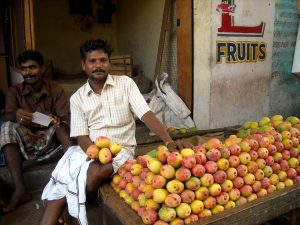Health officials are rushing to contain a coronavirus outbreak in one of Asia’s largest fruit and vegetable markets in the southern Indian city of Chennai.
So far, the market has been linked to more than 500 cases in several districts of Tamil Nadu state and adjacent Kerala state. Over 7,000 people with connections to the Koyambedu market are being traced and quarantined, said J. Radhakrishnan, the leader of Chennai’s response to the coronavirus.
The market, which had remained open during India’s six-week virus lockdown, is central to the region’s food supply chain. The challenge for public health officials is to track the many traders, workers, and shoppers who visited the market.
Experts said the virus cluster has exposed India’s poor surveillance during the pandemic. They said the country’s long denial of how prevalent the virus was resulted in people not taking precautions, and warned that the market cluster could result in cases in India snowballing.
Crucially, public health experts fear that many who visited the market will not inform authorities, fearing stigma or quarantines, and that some workers weren’t registered. Radhakrishnan said the state government is aggressively testing in response and has conducted over 170,000 tests so far.
Dr. T. Sundararaman, a community medicine expert, said such large gatherings are exactly where virus clusters are likely to emerge. “If you don’t look until it’s too late … it is a reasonable thing to suspect that clusters will emerge,” he said.
With 2,008 cases, including 545 detected in the past two days, Chennai now accounts for half of Tamil Nadu’s total of 4,058 cases. Of these, over a thousand were detected in the past 48 hours and many were linked to the market, the state government said. India had a total of almost 50,000 cases on Wednesday, with almost 3,000 new cases reported in the past day.
The neighborhood of Nerkandrum, where many residents work in the market complex, has been sealed. More than 100 people have tested positive in the area, which is about 3 kilometers (1.8 miles) from the Koyambedu market.
On April 24, after a spike in cases in the state, the government announced a four-day “intensified” lockdown aimed at stricter social distancing. But this backfired as thousands rushed to the market to stock up on supplies. On April 27, the first case was detected in the market. It wasn’t until Monday — one week later — that the market was eventually closed.
Authorities had feared that a sudden closure of the market would have led to food shortages in the state and instead tried to scale down operations. Some of the shops in the market will now be relocated to the city’s suburbs so that the food supply chain isn’t entirely severed, said officials.
Retired virologist and pediatrician Dr. T. Jacob John said the crowding in the market showed the lockdown “was leaky.” He pointed to neighboring Kerala state’s initiative of delivering groceries to people’s homes, saying, “People have to live … they have to buy food. The government should have anticipated the people’s need.”
Public health officials said use of face masks, hand sanitizers, and social distancing hadn’t been implemented in the market. John said part of the blame lies with India’s continuing denial that the virus is spreading freely through communities. “If you admitted that community transmission was happening, then this would not have happened. Everybody would have taken precautions,” he said.
Sundararaman warned that the country is still not testing sufficiently and not casting a wide enough net in its surveillance. India is testing around 75,000 samples daily, but its testing criteria outside of known hotspots remains restricted, with those with minor symptoms like a runny nose or cough not being tested.
By AP science writer Aniruddha Ghosal
Associated Press writer Emily Schmall contributed to this report.

































